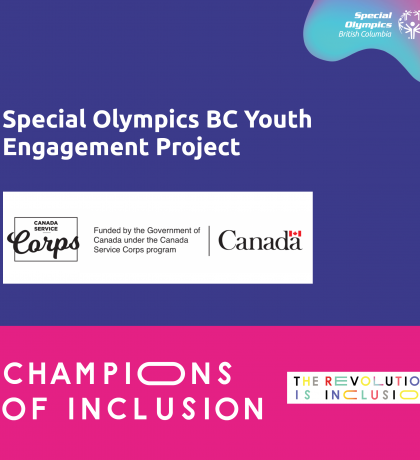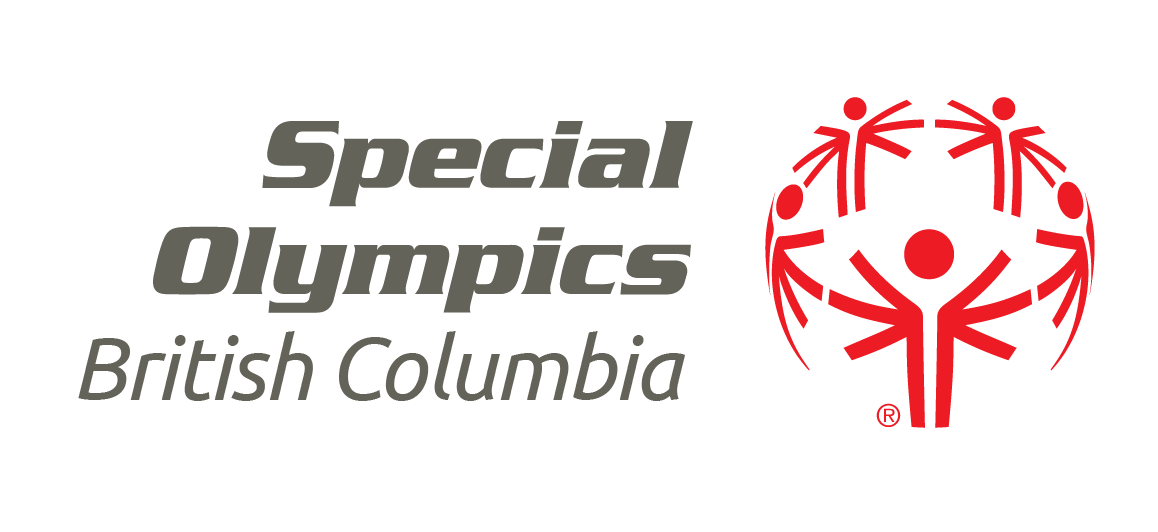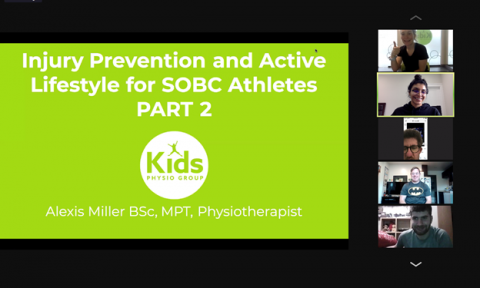
Too often individuals with intellectual disabilities are forgotten, marginalized, and disrespected, even today. In Special Olympics, athletes and their supporters open hearts and minds towards people with intellectual disabilities through year-round sport programs, empowering competitions, and inclusive awareness initiatives.
Our amazing athletes need the help of young people who want to change the world and create a more inclusive future.
In 2021-22, Special Olympics British Columbia will run our third Youth Engagement Project, collaborating with young changemakers ages 16 to 29 to address the need for greater inclusion and respect for people with intellectual disabilities in communities across B.C.
Participants create resources, support, and inclusion for people with intellectual disabilities throughout the province. Their sport and awareness initiatives lead to so many positive benefits in their communities and province-wide.
Young changemakers are invited to apply by July 4 to be part of the 2021-22 SOBC Youth Engagement Project. You can make a difference!
Find project and application details
Surrey volunteer Pavneet Kalsi worked hard to create the Lifelong Learning Platform as part of the 2020-21 SOBC Youth Engagement Project. She was also a valued and dedicated member of the inaugural Youth Engagement Project cohort. Below she graciously took the time to reflect on her experiences in 2020-21!
What did you offer?
I organized three online, interactive workshops in collaboration with professionals to educate athletes on topics they can apply to their everyday life. The first was on nutrition, hosted by a registered dietician, and the other two were hosted by a physiotherapist.
In our first workshop, we talked about the updated food guide and ways to fuel ourselves for the day to be healthy and things to keep in mind about being an athlete. With the physiotherapist, we talked about posture, warmups, cool downs, and exercises we can do at home to stay active.
Why did you decide to do this project?
Due to COVID-19, I felt that this was a great time for reflection and improvements we can make with our lives. However, I found that it is difficult to access resources that one can trust. Thus, I decided to partner up with professionals that I know who can provide information that athletes would benefit from as stated above.
How did you feel about the results?
I had three components that I wanted to achieve: ·
- Component #1: Reaching out to the professionals I trust
- Component #2: Creating content to present to the athletes
- Component #3: Implementing 3 workshops with new and interesting material
I feel that I was able to make the impact that I wanted to. My goal was to have about five athletes per workshop, and while in the first workshop we had three, the next ones we had 22 and 13. Most importantly, the athletes seemed like they were having fun! At the end of the workshop, they all left with smiles and said thank you to the presenter and myself. That made me see that they appreciated what we had done!
I definitely think that my leadership skills have improved. I learned how to better delegate tasks, collaborate with others, make a timeline, and lead the workshops. Additionally, I learned to take responsibilities and do my steps in confidence.
The professionals seemed comfortable and calm during the presentation. They were very positive and had extensive experience in their communication skills, especially in breaking down the components into simpler terms, which was essential for the workshop style that we wanted to execute. Many athletes said thank you to the presenters at the end and were grateful to their time
How did the Special Olympics athletes feel about the sessions?
My intention was to have workshops where athletes could interact with each other and the presenter. I felt that this was achieved because the athletes were asking questions and sharing their thoughts and views, and the presenters were happily responding to them and providing insight. The athletes were also able to express their thoughts in the google forums that were provided. I believe that due to the interactions, we had athletes come to multiple, or all of the workshops.
How did your presenters feel about the sessions?
Alexis Miller, Physiotherapist, Kids Physio: “Getting to work with SOBC through Pavneet was such a fun and positive experience! I did small lessons on fitness and importance of exercise followed by a workout demo class! Both of the sessions included time for sharing experiences and stories, answering questions and learning different views. I was so impressed and overjoyed to hear of all the fun and engaging activities these athletes and members already partake in and I was so pleased with their thirst for new knowledge! Every single person contributed ideas and participated in the learning and workouts! It was really an amazing experience and I truly feel like I was learning with everyone. I think the positive, inclusive environment SOBC has provided for these athletes is very special!”
Why is it important to create more inclusion of people with intellectual disabilities? How did your project create inclusion?
I believe inclusion summarizes how we want to be part of the community and make a positive contribution. Those with intellectual disabilities are often not seen for their abilities, but it is important we try and strengthen the existing abilities to develop further confidence. My workshops were inclusive in the structure and design, so the material was easy to understand, and also specific to topics that would be interesting and relevant to athletes.
FIND STORIES AND RESOURCES FROM THE 2020-21 PROJECTS
FIND STORIES AND RESOURCES FROM THE 2019-20 PROJECTS
We are so proud to work with these thoughtful, passionate, interesting young people, and so grateful for all their efforts to create inclusion and awareness for Special Olympics athletes!
Hear more from Kalsi:

